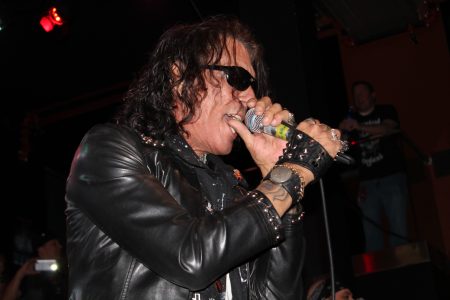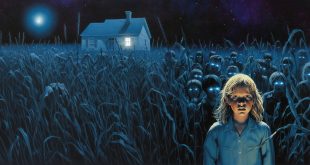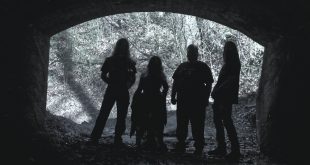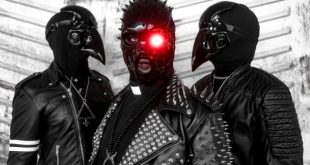Stephen Pearcy is best known for fronting Ratt, a multi-platinum California quintet pivotal to Sunset Strip glam metal throughout the 80s. Their hits, “Round and Round,” “Lay it Down,” “Slip of the Lip,” and “Way Cool Jr.” are often regarded as classics of the scene. While the death of co-writer/lead guitarist Robbin Crosby in 2002 dealt a perturbing blow, Ratt’s imprint on metal surges unscathed to this day.
The band’s last album was 2010’s Infestation, a supercharged revisiting of their signature sound, which received rave reviews upon its release. However, dwindling rapport between members caused the band to part ways indefinitely. Pearcy stressed that this wasn’t a permanent parting per-se, but a time to assess that rapport for all it’s worth. “We’ve had some problems—which, I’m sure everyone knows about now—that kind of disrupted the whole thing, so we took some time off,” he reiterated. Among these problems, besides lack of rapport, was a series of persistent legal ramblings over ownership of the band name and logo.
Despite this, Pearcy hopes to clear any bad blood in the long term, and is positive for Ratt’s eventual reunion. He presently aims to focus on promoting his new solo album, Smash, due out on the 27th of this month. The album is highly varied as it is solidly conceptual, and will be his fourth to date.
ME: When it comes to your solo material in general, do you tend to let your influences run spontaneously and without excluding what you’re known for?
Stephen: Of course! Ratt’s music is its own entity and animal, and it has its own schematics. With my solo stuff, I tend to do whatever I like—an acoustic song, a really heavy song—and go places and talk about things that I want to. It’s my freedom of speech. That’s one thing I like about it, and I’m always writing, so what else can I do, you know? Just try to get it out and get it heard! I don’t care if it sells 10 million or nil-million; it’s just what I do. You do the best that you can.
ME: Right off the bat, Smash is stylistically diverse. I understand that you channel a lot of stuff from your formative years, like Led Zeppelin and Judas Priest. Was there a moment during this process where you’d listen in depth to their classic material to get inspired?
Stephen: Nope, not at all. It’s just my guitar player Erik {Ferentinos], who I co-wrote most of the stuff with. We’d just come up with songs and take them through a journey. That’s pretty much how it happens. I don’t think about anything. If it sounds like something that’s an influence, and if it’s a good one, that’s even better! I don’t really think about emulating anybody; it’s more of an influential thing that just came out. That’s a compliment to both of us, how I respect them. And I’m sure they’d say “Woah, that sounds pretty good!” But that’s about it—the light and the dark of the things, you know?
I wanted this record to be diverse. The subject matter’s very different than what was expected, and what would be expected. And there’s some personal stuff in there—a song I wrote for my daughter, “Rain.” I’m able to do whatever I want with my solo stuff, so this is what you get.
ME: So the process is straight from the heart without too much active listening of others.
Stephen: Yeah, there could be months before I listen to anything outside of what I’m doing. It’s totally what I’m into. Even down to if I’m just listening to riffs, writing lyrics, or trying to arrange something. That’s all I listen to; 24/7. It’s in my car; it’s in my phone; it’s in my computer, you know? The headphones are always on.
ME: How did you decide on the sequencing of the album, to find a stylistic and thematic balance between tracks?
Stephen: Well, I like the number 13 on records; 13 songs. As far as sequencing, it was important on this record because of summing up the subject matter. I wanted a beginning, middle, and end, and we achieved that. Other than that, we just made sure the songs sound like they’re supposed to, and at the end of the day, I put it in perspective and deliver it. I make sure it’s the best we can do, listen to it on every format possible—computer, big speakers, in the car. And, like I’d said, the lyrics changed a lot until I was happy with what I was actually addressing, and that’s how that worked.
ME: As a musician myself, I’ve been noticing that regardless where we end up, we never forget our roots. Beside Zeppelin and Priest, would you also consider the transition, from Mickey Ratt to Ratt, to have impacted your musicianship the same way?
Stephen: Oh, 100 percent, because I wrote all the songs on the Ratt EP and they were Mickey Ratt songs. When I first got a guitar, I started writing my own songs, as crazy as it sounds. A lot of those even ended up on Out of the Cellar— “In Your Direction,” “Back for More.” Robbin and I co-wrote “You Think You’re Tough” but the others were Mickey Ratt songs. We’d play them live, and that’s what steered the way to what Ratt’s music would be. It was just a natural progression.
My other influences are Blue Oyster Cult, Ozzy, Sabbath, Jeff Beck, David Bowie. You wouldn’t hear the influences; maybe more so now you’d hear a little Bowie. But, you know, that’s how I worked. I don’t come back to my influences; they come back to me, you know?
ME: Even now with Smash, you have Ratt personnel—Beau Hill—who produced the early records.
Stephen: Yeah, Beau Hill was brought in on the first song, “I Can’t Take It.” I’d tried to get him to do the rest of the record but he wasn’t available. I mean he might’ve went out of the country, so we ended up producing the record on our own. [Greg D’Angelo], myself, Matt Thorne, and Erik just collectively took the reins and did what we did. We’d been around too long to not know what to do. I’d learned quite a lot from Beau, and I really didn’t want to follow the Ratt schematics, so I think we made the right decision. “Let’s do it on our own; we know what we’re doing.” We wanted to not squash things or have too many vocals; we wanted it to be clear, you know what I’m saying? So we had to take a different approach which was great; it worked well for the record.
ME: Do you feel the album’s overall presentation best represents what you’d intended?
Stephen: 100 percent, down to the smasher character, you know, the horned character with the halo. The album is about what you think that’s light is actually dark. It goes through this whole system of being stifled as people, things descending from space, a lot of stuff besides “Hey! Rock n’ roll!” you know what I mean? There’s substance in there, which is great! It’s what was in me at the time, and that’s what I worked with—the underworld, the overworld, the higher power.
ME: Now besides your band material, you also write stuff for movies and TV. I’d imagine those proclivities all translate well?
Stephen: Well, when I write a song for a movie or for TV, I like that kind of stuff. That’s something I’ve wanted to do. Then I have other interests, like I sponsor racecars. I’m still trying to get something going for this year. Not much time, but I just like to do different things, you know? I’m not just someone who gets on stage and yells at people.
Now everything’s more of a sobering experience; it’s easier for me to get things done and accomplished. Not like it wasn’t before; I’ve done it all before with somebody on the floor and standing up. But now it’s a whole different ballgame so I want to see things done right—no complications or interference. That’s how I work. I just move straight ahead.
ME: I also see you’ve invented a mic holder, Mic Knuckles. What’s that about?
Stephen: A friend of mine creates mics, and I just put a prototype together of a mic holder that could be utilized in many ways. It will never fall off your hands and can be used as a defense mechanism (laughs)! They just look cool, and I think everybody and their mother has one now. It’s just something I like to do because I’d figured nobody has any product out there for singers. It’s one thing to make a mic stand, but it’s another thing to make a mic holder that’s cool looking and can serve a purpose.
ME: Throughout your career, be it with Ratt or your solo material, the media tends to misconceive your personal and professional struggles. Have you always held the mentality of simply moving forward, not getting caught up in what’s being said?
Stephen: Yeah, I don’t care what the press says. It really doesn’t bother me if somebody says I suck. And if they do, I’d say “Well, thank you. I must’ve been awarded three platinum albums for sucking!”
ME: It’s complimentary.
Stephen: Yup. I’m first and foremost a songwriter, and then I sing and play guitar. As far as the press, everybody’s entitled to their opinion. We all have our on and off days. I make no excuses for messing up; I just get out there and do what I do. Eventually, though, in my case, I want to just really wipe off the dust and not fall again. So when I say it’s a sobering experience, it literally is. There’re things I’ve wanted to accomplish that have nothing to do with music, but it just makes everything in music a lot better.
ME: It’s less about drugs and booze and more tea and hot chocolate.
Stephen: (Laughs)! It’s more like a ton of coffee. That’s about it.
ME: A week ago, you’d announced on Twitter that Ratt’s preparing for a new album. Let’s talk a bit about that.
Stephen: Sure! Well, we’ve been talking. When Warren and I get together, we talk about songs, and when he shows me a riff, I’ll tell him, “Let’s do something with this!” That’s how easy it is, you know? That’s how I work in Ratt, and how I work in general with anybody. If there’s something I hear that I like, I say “Let’s do this—let’s do it right now! We don’t have to wait ‘til tomorrow. We’ve got a studio; let’s go in there and do it!”
So we hope to introduce some kind of new Ratt record later in the year. Whether it’s going to be recorded and done is one thing, but we can sure as heck get started on it.
ME: With the guys, you’re all still relatively close.
Stephen: Yeah, of course! That’s the only way it’ll work. You get rid of the cancer and the body lives, you know?
ME: Lastly, anything you’d like to say to your fans?
Stephen: I appreciate them hanging out this long, and there’s more to come. We’re not finished yet ‘til I say we’re finished. Right now, there’re some things to do, good times to be had, and music to be heard. We’re going out and playing some shows. We’ve got the Smash tour going on ‘til July starting in February, a couple Ratt shows lined up—some big ones. Most probably in the latter half of the year, we’ll go on a full-blown Ratt rampage and see what happens.
Stephen Pearcy Socials:
 Music Existence Because of Music, We Exist
Music Existence Because of Music, We Exist




